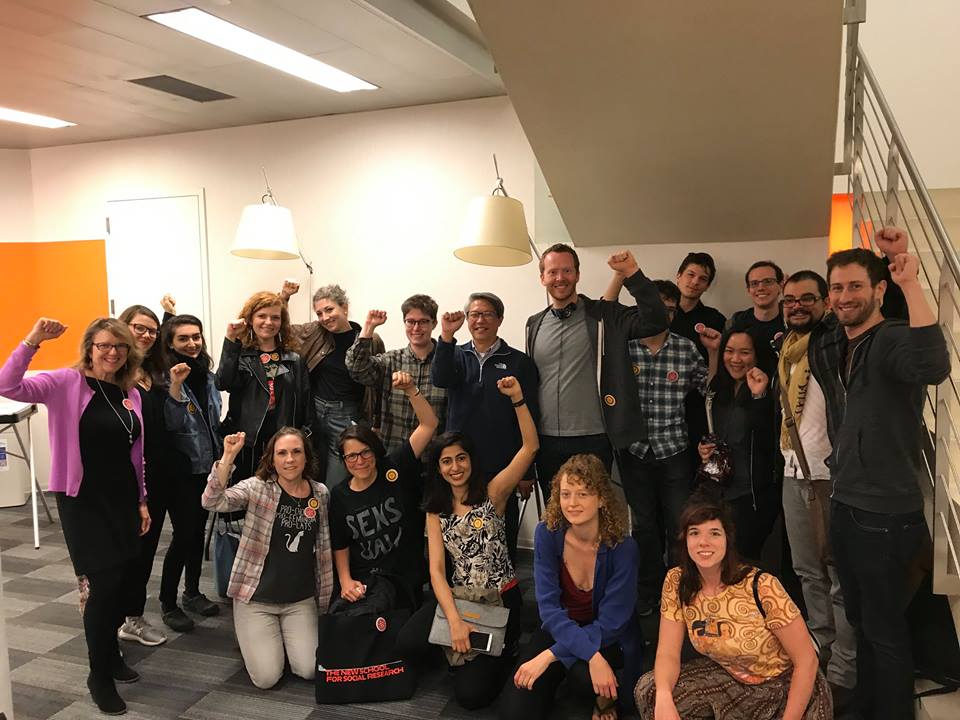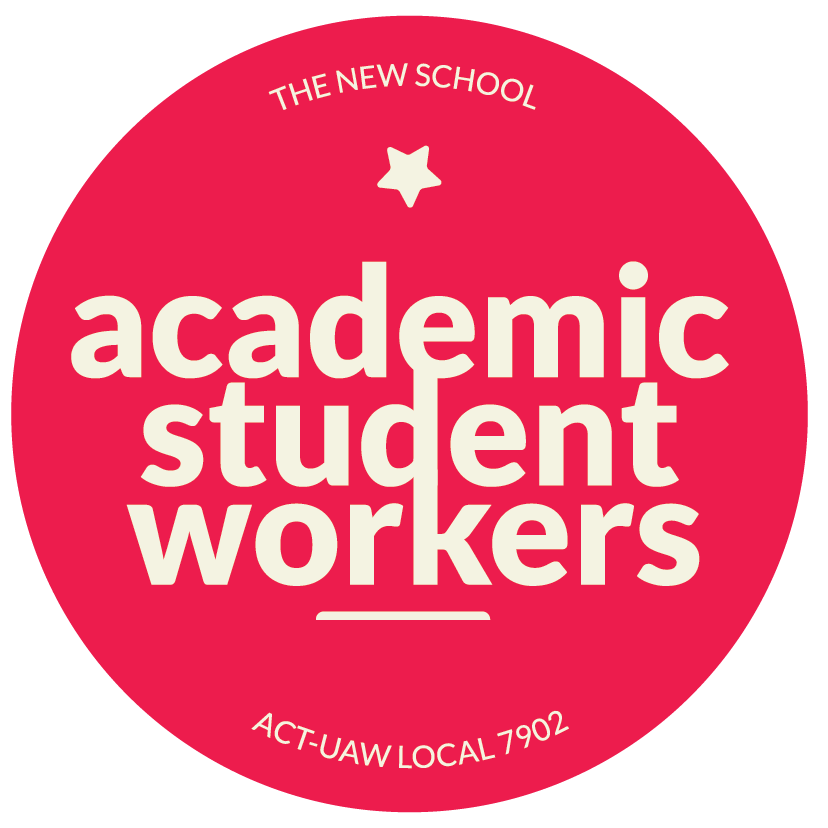
Know the Contract
You are the Union. Know your rights.
Wages & Raises
SIGNING BONUS: Anyone who worked as an academic student worker between fall 2017 and fall 2018 and was enrolled in the spring 2019 semester received a $300 bonus in February of 2019.
WAGES: Wages increase 2% annually. All wages below are dollars per hour.
| Date | CAs | Tutors | RAs | TAs | TFs |
| February 1, 2019 | $16.32 | $19.38 | $20.40 | $30.60 | $40.80 |
| August 2019 | $16.65 | $19.77 | $20.81 | $31.21 | $41.62 |
| August 2020 | 2% Increase | 2% Increase | 2% Increase | 2% Increase | 2% Increase |
| August 2021 | 2% Increase | 2% Increase | 2% Increase | 2% Increase | 2% Increase |
| August 2022 | 2%
($17.67) | 2%
($20.98) | 2% ($22.08) | 2%
($33.12) |
2% ($44.16) |
Health Insurance & Rebates
UNIVERSITY SERVICES FEE: You are entitled to a 100% rebate of the university services fee (currently $600) if you work at least 75 hours (an average of 5 hrs/wk) over the course of the semester/term.
INTERNATIONAL STUDENT FEE: You are entitled to a 100% rebate on the international student fee if you work at least 75 hours (an average of 5 hrs/wk) over the course of the semester/term.
HEALTHCARE: To receive a rebate on your health insurance premium, you must have worked at least 150 hours (an average of 10 hrs/wk) over the course of the semester/term. You must also be enrolled in and have paid for the University’s Student Health Insurance Plan. If you meet both of these criteria, your rebate size will be as follows:
Tier 1: If you have worked at least 150 hours in exactly one semester/term since fall 2017, not including the current semester, you will receive a tier 1 rebate. E.g. this semester/term is the second time you have worked at least 150 hours.
Tier 2: If you have worked at least 150 hours in two or more semesters/terms since fall 2017, not including the current semester, you will receive a tier 2 rebate. E.g. this semester/term is the third or more time you have worked at least 150 hours.
| Date | Tier 1 | Tier 2 |
| February 1, 2019 | 35% | 50% |
| August, 2019 | 40% | 55% |
| August, 2020 | 45% | 60% |
| August, 2021 | 50% | 65% |
| August, 2022 | 50% | 65% |
DEPENDENT COVERAGE: If you qualify for either the Tier 1 or Tier 2 Health Insurance Premium Rebate and buy dependent coverage through the school, you can apply for a 10% reimbursement of the dependent coverage premium.
Anti-Discrimination & Ant-Harassment
The university shall not discriminate against academic student workers on the basis of race, color, creed, national origin, religion, religious practices, sex or gender (including gender identity and expression), sexual orientation, age, physical or mental disability, citizenship status, marital status, veteran status, parental status, political beliefs, union activity, or any other legal protected status.
If you’re experiencing discrimination or harassment of any kind, you now have recourse through our grievance procedure. See Enforcing Your Rights (Grievance Procedure).
Addition Rights and Benefits
- DISABILITY ACCOMMODATION: If you are disabled, the university must put into place approved, reasonable workplace accommodations for you in a timely manner after you request accommodation. If you are not able to work because you are waiting for accommodation, the university must still pay you for the time you would have worked.
- APPLYING FOR JOBS: You have the right to apply for any academic student work position. The school cannot place a limit on the number of positions you can apply to.
- HIRING DECISIONS: The school must make its hiring decision based on criteria related only to your qualifications for the position to which you’re applying.
- OFFER LETTER: Beginning fall 2019, the school must communicate the following info to you in a timely manner before you accept or reject your appointment so that you can make an informed decision whether or not to take the job: your appointment title, workload and hours, stipend amount or hourly wages, supervisor name and contact info, the beginning and end dates or duration of your employment, required duties, and related expenses.
- STARTING A NEW JOB:
- The university must communicate to you all the paperwork you should fill out and steps you must perform to begin working and get paid within 3 days of your accepting an appointment. If you are an international student worker, ISSS must issue documents authorizing you to work within 7 days of your submitting necessary paperwork.
- The school cannot require you to work until HR confirms your appointment. HR must issue a confirmation letter with information about your job and the union. For a complete list of the information that the school must issue you in your confirmation letter, see Article XII, section E of our contract. [link]
- CANCELLED ASSIGNMENT: If your semester- or year-long assignment is cancelled after the school has confirmed your appointment, the school must try to place you in similar job. If it does not, you are entitled to 30% of the wages you would have earned had you worked the job one semester.
- LATE PAY: The school must pay you within 28 days of your beginning your work assignment. If you are paid late after receiving your appointment confirmation and notify HR, HR must issue you a paid card within 5 days or direction deposit within 10 days. If, through not fault of your own, late pay causes you to incur university related fees, you have the right to have those fees waived.
- WORKLOAD AND HOURS: The school cannot require you to work more hours than specified in your confirmation letter. Your boss cannot require you to perform work outside the duties listed in your confirmation letter.
- PERSONNEL FILE ACCESS: You have the right to view your personnel file, a set of documents listing your work history at TNS, at least once a semester.
- JOB EXPENSE REIMBURSEMENT: The school cannot require you to cover the cost of approved, job related expenses with your own money. If you do cover such costs with your own money, you have the right to seek reimbursement through MyDay.
- BREASTFEEDING: The school must allow you a responsible amount of break time to breastfeed and nurse your child.
- LEAVES OF ABSENCE:
- If qualify for New York City’s Paid Sick Leave Law [link], you will accrue one hour of paid sick leave for every 30 hours you’ve worked up to a maximum of 40 hours-sick time per fiscal year (July 1 – June 30). Even if you do not qualify for the Paid sick Leave Law, the school will not unreasonably deny you unpaid leave time to recover or to help a spouse or child recover.
- If you are assigned to a semester long course, you have the right to one paid emergency absence per semester.
- HEALTH & SAFTEY: You have the right to a safe, clean, and healthy working environment on the university’s campus or a university-owned facility.
- DISCIPLINE AND TERMINATION: You can only be fired for “Just Cause,” meaning only if you break your job or the university’s rules. You have the right to a union representative at any meeting related to your work that you suspect could result in disciplinary action against you.
Enforcing Your Rights
Before we won a union, if you were mistreated at your campus job, the only form of recourse you had was to appeal to TNS’ administration. If you didn’t like the administration’s decision, there was little you could do about it.
Now that we’ve won a union, not only do you have additional rights and benefits, you also have a more powerful mechanism to ensure that the university and/or your boss 1) does not mistreat you and 2) respects your rights and benefits. This mechanism is called the grievance procedure. Here’s how it works:
- You have an issue at your job. The issue could be as minor as you being paid a couple of days late or as major as you being harassed by your supervising professor. You believe the university or your boss is violating our union contract.
- You reach out to your union rep or email us (sensuaw@gmail.com) to report the problem. If the problem you’re facing at work has to do with harassment, then you have up to 365 days to reach out to us. Otherwise, YOU MUST reach out within 20 days of the problem’s occurrence. The sooner you report the problem to us, the better.
- A union rep or steward will be in touch with you to discuss the problem. Sometimes, small problems can be resolved informally. You and the rep will help determine whether the problem can be resolved informally or not.
- If the problem cannot be resolved informally, the rep. will set up an official grievance meeting with university officials. Depending on your problem and whether there are others experiencing it, we may need to have several meetings with the university or only one.
- The university will propose a resolution to your problem. You and your union rep will discuss the resolution. If you and your rep do not find the university’s decision satisfactory, you have the right to appeal your case to a neutral, third-party arbitrator.
- An arbitrator is a neutral professional who resolves disputes between union workers and their employer. We will make our case before the arbitrator and the university will make its case. The arbitrator will make a binding decision, meaning the university must follow the arbitrator’s decision even if it doesn’t like it.
Don’t let the grievance procedure daunt you. We’ll be with you every step of the way. If necessary, we will pay for a lawyer to help during the process. We are here to support you and help you hold the university accountable.
